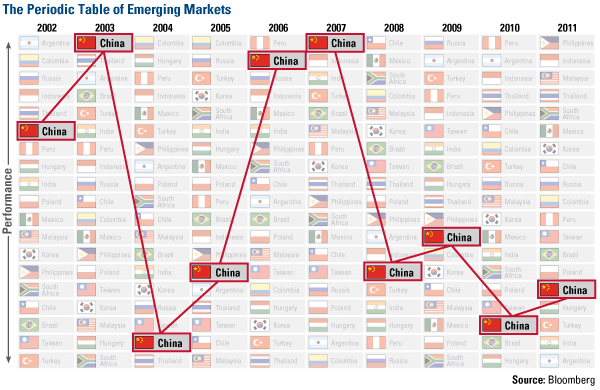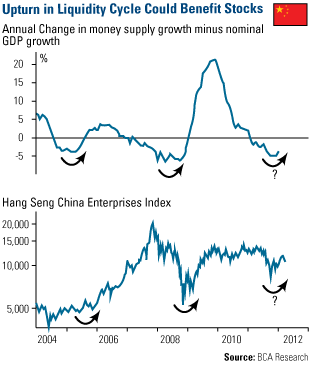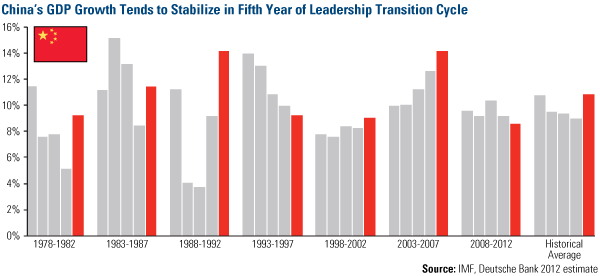By Frank Holmes, CEO and Chief Investment Officer, U.S. Global Investors
The odds of winning tonight’s Mega Millions jackpot are 1 in 175,711,536. This remote chance hasn’t stopped people from lining up to buy a ticket, as the “what-if-I-win” idea seems so thrilling.

Some bears may think the odds of China being the winner among emerging markets in 2012 are also remote. Over the past few years, Chinese stocks have lagged compared to its emerging market peers. However, the Periodic Table of Emerging Marketsperfectly illustrates: last year’s loser can be this year’s winner. Historically, every emerging country has experienced wide price fluctuations from year to year. Over time, though, each country tends to revert to the mean.
In the visual below, we highlighted China’s performance pattern over the past 10 years. Chinese stocks landed in the top half four out of 10 years—2002, 2003, 2006 and 2007. In 2003, China climbed an astounding 163 percent; in 2007, it was the top emerging market again, returning nearly 60 percent.
Since then, the country has fallen to the bottom half of the chart. If you apply the principle of mean reversion, history appears to favor China landing on top during this Year of the Dragon.

See the original Periodic Table of Emerging Markets here.
Unlike the lottery system, China won’t leave its success to pure luck. If the Dragon doesn’t breathe fire into markets, it may be a shot of liquidity injected by policy easing that could drive stock prices higher. Macroeconomic theory states that when a country’s money supply exceeds economic growth, the excess liquidity tends to drive up asset prices, including stocks.
BCA Research documented this trend in China over the past eight years. The research firm compared the difference between the change in money supply growth and nominal GDP growth and Chinese stock prices. In both instances when the change in excess liquidity fell to a low, so did stocks. Conversely, the rise of money supply growth compared to GDP growth “coincided with major rallies” for China’s stock market, according to BCA.

Today, it appears that the change in excess liquidity is just beginning to bounce off another low, as are stocks, indicating another potential inflection point.
BCA hedges China’s possible stock advancement in the short-term if signs of economic improvement continue because they “reduce the odds of aggressive policy easing.” A few weeks ago, I discussed how investors seemed to overlook China’s focused macro policy strategy, with its actions deliberate and purposeful. This year, the government has extra incentive to sustain meaningful growth as it transitions to a new leadership by the end of the year. As President Hu Jintao and Premier Wen Jiabao depart, Xi Jinping and Li Keqiang are expected to take over.

Looking at historical GDP growth per year since 1978, Deutsche Bank finds there’s precedence for this idea. During the fifth year of the leadership transition cycle, “high or stable” GDP growth was maintained, with the exception being the Asian Financial Crisis in 1997.

When I was in Singapore at the Asia Mining Congress this week, I was fortunate to be among a group of sharp and intelligent experts across the financial and mining industries. One China bull presenting an excellent case for the country was Jing Ulrich, JP Morgan’s managing director and chairman of China equities and commodities group. She’s the Oprah Winfrey of the investment world, as for the past three years, Forbes Magazine has ranked her among the 50 Most Powerful Women in Business.
Ulrich expressed similar views toward China and its political will in a recent “Hands-On China Report” following her attendance at the China Development Forum in Beijing. She said that the government ministers emphasized their commitment to rebalancing the economy toward consumption. While “fundamentals are currently sound, the nation must modify its ‘imbalanced, uncoordinated and unsustainable’ course of development,” says Ulrich. Importantly, the government had the financial resources to effect this change and considered it important to maintain sustainable growth, writes Ulrich.
The ups and downs of this road toward a consumption-led economy are topics I’ll cover in next week’s webcast on China. I will be joined by CLSA’s Andy Rothman. Together, we’ll discuss what investors should expect from China in terms of long-term GDP growth, fixed asset investment, exports and the housing market. Be sure to sign up now.
Copyright © U.S. Global Investors











